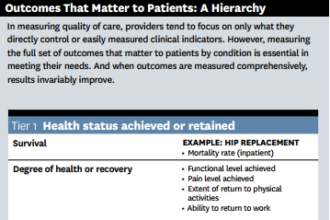Writing in Today’s Hospitalist, Dr. Stella Fitzgibbons offers specific and useful advice to physicians who have to deal with the wishes of a family when a patient can longer speak for him or herself. I’m confident that her approach will yield constructive results in most situations, but I’m uncomfortable with the shortage of empathy and reflectiveness that the article ultimately conveys.
The scenario she introduces is as follows:
Writing in Today’s Hospitalist, Dr. Stella Fitzgibbons offers specific and useful advice to physicians who have to deal with the wishes of a family when a patient can longer speak for him or herself. I’m confident that her approach will yield constructive results in most situations, but I’m uncomfortable with the shortage of empathy and reflectiveness that the article ultimately conveys.
The scenario she introduces is as follows:
[W]hat about a patient who can no longer speak for himself—and family members who either seem unrealistic about the effectiveness of medical treatment or actually refuse to honor his wishes? What about a doctor’s duty to relieve suffering and not provide treatment the patient wouldn’t want or that does him no good?
To summarize, here are the tactics Fitzgibbons recommends:
- Be sure all the doctors seeing the patient are saying the same thing –so that a doc who doesn’t like to give bad news doesn’t inadvertently give the family the idea that a cure is possible
- Get records from prior physicians –since families may transfer patients from hospital to hospital until they hear what they want
- Present facts and show them CTs. “Make it clear that the patient’s doctors know what is wrong and are not just speculating”
- Bring in a neurologist you trust so “the family can’t claim that he’s unqualified to talk about the prognosis”
- Find a chaplain who will be on your side
- Seek help from legal staff so you can ignore the family’s wishes and use the patient’s advance directive
- Persuade the patient that their “advisor” is less qualified than yours and that their stories of relatives who recovered are irrelevant
- If you think they are acting against the patient’s interests for their own gain, e.g., “they have been paying their own rent with his disability check” –then let the know you’re aware of it
- Stick to your principles since you know you’re doing the right thing for your patient
- It concerns me that all the focus on bringing in other parties is about getting them to team up with her and reinforce her opinion. She doesn’t once suggest asking someone to take a fresh look clinically or to help her see things from the family’s perspective
- Physicians are notoriously poor at predicting how long someone is going to live. It’s unreasonable to expect a family to trust them on this
- A lot of physicians don’t like hopeless cases or “difficult” patients or families. Consciously or sub-consciously they may be ready to move on to the next case –of which there are a seemingly endlessly supply. Meanwhile, the family may not be quite so ready to let go of grandpa
- The issue with the advance directive is extremely tricky. On the one hand it represents the patient’s wishes –but those wishes were set out at a point in time different from the present, when things may have looked different. It’s possible that the physician can better interpret the patient’s wishes than the family, but both have biases






